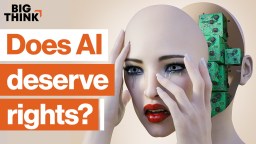MICHIO KAKU: In the entire universe, there are two great unsolved problems. The two greatest problems in all of science, first of all, is about the very big. It's about the origin of the universe. Why did it bang? Why do we have an expanding universe? And I personally work on something called the multiverse, which we think is the dominant source of theories that gives us the universe before creation itself-- the multiverse. But there is also the mystery of inner space, not outer space.
And that's the human mind. Where does consciousness come from? And I think that in my book, The Future of the Mind, I try to make a stab at what is consciousness? First of all, let me explain my theory. I have my own theory of consciousness. I think consciousness is the sum total of all feedback loops necessary to create a model of yourself in space, in society, and in time. Now, I'm a physicist. We like to measure things and quantify things. I think there is a unit of consciousness. If consciousness is a sum total of all feedback loops necessary to create a picture of yourself in space, in society, and in time, then the unit of consciousness is a thermostat.
A thermostat has one unit of consciousness, because it has one feedback loop-- measures temperature. Now, a plant has maybe five units of consciousness, because plants have to regulate temperature. They have to regulate humidity, the direction of gravity, when to sprout. So there are maybe five or so feedback loops in a plant. Then we go to alligators. The alligators are masters of the back part of the brain. And then you have maybe several hundred feedback loops that govern space. That's what alligators are very good at.
Their brain, if you look at the parts of the back of the brain, we, too, have the reptilian brain that governs our understanding of space, where we are in space. And then, going forward in time, evolution gave us the monkey brain, the center of the brain, the limbic system. And the limbic system, in turn, governs society. It governs where we are with respect to our elders, our children, other human beings. Pack mentality, wolves, all of them have a developed central part of the brain, the monkey brain. And then the front part of the brain is what distinguishes us from the animals. It is the temporal brain that constantly simulates the future.
Animals don't do that. In fact, animals don't even have much of a memory. When you look at a brain scan of what is the brain doing when it's thinking, thinking hard? What is the brain doing? You find out that the prefrontal cortex is active, and it is accessing memories of the past. You see, animals don't do that. Animals have not much of a memory. They don't see the future, because there's no necessity to see the future. There's no necessity to have much of a memory. In fact, the purpose of memory could be to simulate the future. Animals don't need it.
Why didn't the dinosaurs become intelligent? Well, they didn't need to become intelligent, because we humans sometimes overexaggerate the importance of intelligence. Intelligence is not necessary to live in the forest, but we are maladapted to live in the forest. We don't run very fast. We can't fly. Our skin is very fragile. We're not very strong. We have only one thing going for us -- our brain. And what separates us from the animals? We see the future. We plot. We scheme. So that's my theory of intelligence. And then you can then categorize animals. You can categorize machines on the basis of this category.
Level 1 would be alligators. Level 2 would be monkeys -- I mean, not monkeys, but social animals, like wolves. Level 3 would be just us. OK, we have the third level of consciousness. And then what about robots? What do robots have? Robots will be level 1. They can barely see what's around them and start to make some changes. They don't have emotions. They don't see social hierarchy. They can't interact socially with humans. And of course, they certainly don't see the future in all its forms.
Now, they can simulate parts of the future. They could model airflow on an airplane wing, for example. So robots can see the future in one direction. We see the future in all directions. So robots would be level one in conscious. OK? Plants would be level zero, that is, just a few feedback loops. We're the highest. We see the future. And then I think this will replace the IQ exam.
I think the IQ exam measures one aspect of intelligence, and that is clerical skills. Yes, I think IQ exams measure something. They measure how well you do on IQ exams. And what is it that IQ exams test you for? Clerical skills. So I personally think that clerics and maybe lawyers, who score very high on an IQ exam-- but that doesn't mean they are, quote, "intelligent." Intelligence, to me, is seeing the future in all its forms, whether you're a bank robber, whether you are a physicist, whether you're a gymnast, whatever. That, I think, is what intelligence is.






